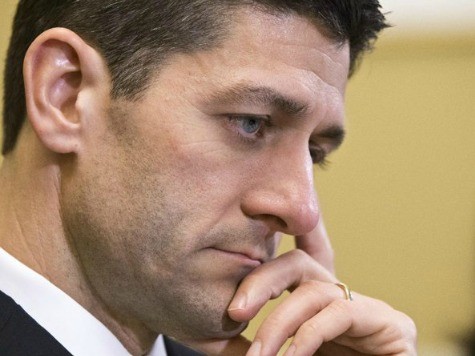
Black leaders from all political persuasions–left, right and center–are questioning House Budget Committee chairman Rep. Paul Ryan (R-WI) on the economic impacts on American workers, especially within the black community, of granting amnesty to America’s at least 11 million illegal aliens.
In a letter sent early Tuesday, the Black American Leadership Alliance (BALA) wrote to Ryan “to express our concerns over the possible trajectory that immigration reform may take in the House.”
“We write in our capacity as leaders of the Black American Leadership Alliance, a Washington, DC-based organization whose primary mission is to further the economic and social interests of the black community,” the group wrote to Ryan. “We are concerned about the irreparable damage to the black community that an earned legalization plan, or any other similar House bill granting amnesty to illegal immigrants, would cause.”
The group argues that the passage of an “amnesty bill” into law would have “disastrous effects” economically “on all low-wage workers” but specifically “that the impact on African Americans would be especially catastrophic.” It cites various research by the Center for Immigration Studies (CIS), the U.S. Commission on Civil Rights, the Department of Labor, and Harvard economist George Borjas, among other sources, to make its case.
“As you likely know, the African American unemployment rate is 12.6%, nearly double the national average,” BALA wrote to Ryan. “A number of studies have emerged in recent years by reputable organizations, such as the DC-based Center for Immigration Studies, which indicate that black workers will suffer the greatest harm if any far-reaching amnesty bill becomes law. We are asking that you oppose the passage of an amnesty bill for illegal immigrants, because of the dramatic effect it will have on the availability of employment for African American workers.”
The group agrees with Ryan that America’s immigration system “is broken,” and said it does “appreciate how vocal you have been on the immigration issue in recent months.” BALA said it supports improving border security and interior immigration enforcement and points to some positive developments on those fronts over the past few years.
“Unfortunately, these positive developments have recently been overshadowed by the specter of the Border Security, Economic Opportunity, and Immigration Modernization Act [the Senate’s ‘Gang of Eight’ immigration bill, S. 744],” BALA wrote. “Specifically, we worry that the ‘earned legalization’ component of the bill spells disaster for the low wage communities of color that we advocate for.”
“Many studies have emerged in recent years that detail the harm that mass immigration and amnesty cause the African American community,” they explained. “Both illegal and legal immigration has compounded the black unemployment rate.”
BALA cited several witnesses who provided testimony to the U.S. Commission on Civil Rights who unanimously “found that illegal immigration disproportionately impacted the wages and employment opportunities of African American men.” While some experts disagreed on how disproportionate of an impact amnesty and illegal immigration has on black men, BALA notes there is a consensus that black Americans are harmed by illegal immigration.
The BALA leaders pointed also to Borjas’ latest April 2013 research. “Illegal immigration reduces the wages of native workers by an estimated $99 to $118 billion a year,” Borjas wrote in April. “A theory-based framework predicts that the immigrants who entered the country from 1990 to 2010 reduced the average annual earnings of American workers by $1,396 in the short run. Because immigration (legal and illegal) increased the supply of workers unevenly, the impact varies across skill groups, with high school dropouts being the most negatively affected group.”
Overall, since the high school dropout rate is higher among African-Americans than others, BALA argues based on Borjas’ research that “blacks are especially harmed by illegal immigration.”
BALA thanked Ryan for not publicly pushing the Senate “Gang of Eight” bill, but said it was nonetheless worried about some comments he has made in recent interviews. “Now, we at the Black American Leadership Alliance, realize that you are not necessarily a champion of SB 744 and as a thoughtful legislator have weighed the benefits and drawbacks of any major immigration reform proposal,” the group wrote. “However, we are still concerned with some of the recent positions you have taken regarding immigration reform during interviews.” “
One particular concern that we have is your insistence that any type of major enhancement of border security must be accompanied by an ‘earned legalization’ program,” the letter reads. “A great deal of previous research indicates that any type of legalization program will inevitably encourage more illegal immigration in the future.”
Black leaders who comprise the BALA include conservatives like the Rev. Jesse Lee Peterson, the president and founder of the Brotherhood Organization of a New Destiny (BOND), and Kevin Jackson of The Black Sphere. Liberals like former U.S. Department of Justice immigration attorney Leah Durant and former Congressional Black Caucus foundation executive director Frank Morris also head the group. Both Morris and Durant work for Progressives for Immigration Reform.
The BALA sponsored the recent March For Jobs against amnesty in Washington, D.C.
Ryan’s office did not respond to a request for comment in response to this letter.

COMMENTS
Please let us know if you're having issues with commenting.